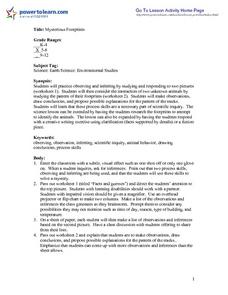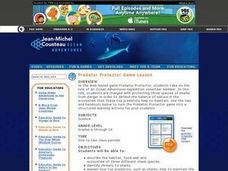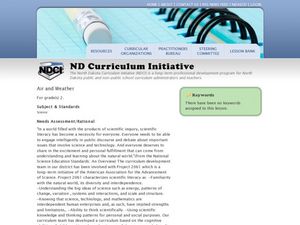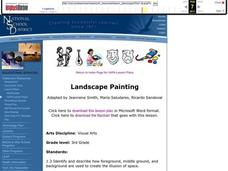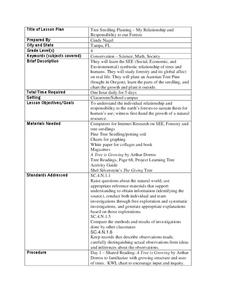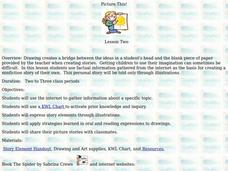Curated OER
Mysterious Footprints
Students, after observing and responding to two pictures, consider the interaction of two unknown animals by examining the pattern of their footprints. They make observations, draw conclusions and propose possible explanations for the...
Curated OER
Principles of Flight: Where are We?
Young scholars explore the concept of topographical maps. In this topographical map lesson, students discuss how airplanes know where to fly. Young scholars use topographical maps to simulate a field trip on the computer.
Curated OER
Shadows of North Carolina's Past
Students construct a timeline of four major culture periods in Native American history from studying archaeological evidence cards.
Curated OER
Whale Watcher Game Lesson
Students participate in an online whale watching game. They identify the reasons for migration and describe the route. They make predictions on what would happen if the ways did not migrate.
Curated OER
Predator Protector Game
Students take on the role of an Ocean Adventures expedition volunteer member and are charged with protecting three species of sharks from danger in order to defend the balance of nature in the ecosystem. They play an online game which...
Curated OER
Design Your Own Rube Goldberg Machine
Students participate in a culminating activity for a unit on Energy and Simple Machines. They are challenged to incorporate simple machines in to a complex mechanical system. While designing and testing their machine they will also...
Curated OER
The Colors of Seasons
Students observe each season and and mark the colors they see. In this colors of the seasons lessons, students read The Mystery of the Missing Hummingbirds and compare their results and note variations of colors in the different...
Curated OER
Science: Solids
Second graders investigate the properties of solids and discover how to classify them. Using rulers, they measure various solids on display. In groups, they play an identification game where one students names a location, such as the...
Benjamin Franklin Tercentenary
Guess What Benjamin Franklin Did!
Young scholars research Ben Franklin's inventions. In this invention lesson, students see the relationship between a need and an invention. Young scholars will engage in a class discussion, read a handout, and play a match the invention...
Curated OER
Horns or Antlers-You Decide!
Young scholars study the difference between horns and antlers. They identify animals who have each and draw pictures of these animals. They experience samples of actual horns and antlers.
Facing History and Ourselves
Identity and Belonging
High schoolers examine World War I war crimes. For this world history activity, students examine a painting by Ashile Gorky, a refugee from the Armenian genocide. High schoolers interpret the piece of art and discuss its historical...
Curated OER
Death On Board La Belle: Finding Clues from Old Bones
Students practice analyzing skeletal remains for clues by using the Internet. In this scientific investigation lesson, students research the La Belle shipwreck using the Internet and written materials, later completing a Skeletal Report...
Curated OER
Air and Weather
Second graders study Earth's materials. In this air and weather lesson plan, 2nd graders note changes in the weather and examine tools that help us study the weather. Students analyze how changes in the environment make changes in the...
Curated OER
A Mendel Seminar
Students analyze Gregor Mendel's discovery of a process of biological evolution. They also explore how recessive and dominant traits are passed from one generation of living organisms to the next. This lesson involves environment...
Curated OER
Landscape Painting
Third graders paint a landscape that demonstrates the illusion of space. In this visual arts lesson, 3rd graders paint a creek with reflections as the focus and include images showing foreground, middle ground, and background within the...
Curated OER
Tree Seedling Planting- My Relationship and Responsibility to our Forests
In this trees lesson plan, 4th graders read the book, A Tree is Growing and complete a KWL chart on how trees grow and how they are used. Students research the symbiotic relationship of humans and trees, create tree collages, plant a...
Curated OER
Pigs, Pigs, Pigs!
Third graders find information about different breeds of pigs using the Internet, books, and encyclopedias. Groups select one breed of pig that interests them. They construct a stuffed likeness of the pig.
Curated OER
Which Brand of Air Freshener is Most Cost Effective?
Students use scientific method to determine cost-effectiveness of air freshener, and create PowerPoint presentations to share their results.
Curated OER
Revolutionary War
Students identify and research significant people, causes, and primary documents of the U.S. Revolutionary War. They create a class Revolutionary War web using Inspiration computer software, write a journal depicting three days in the...
Curated OER
Picture This
Students explore finding facts from the Internet to create a nonfiction story. In this writing activity, students fill out KWL charts and do internet research about the given topic of spiders. Students then create and illustrate their...
Curated OER
The Froggy Page
Students investigate the cycle of life by observing tadpoles. In this biology lesson, students utilize the Internet to read stories, observe pictures, and listen to sounds of frogs. Students create a poster board collage using frog...
Curated OER
Galaxies Galore, Games and More
Students practice skills used in scientific investigation while studying the three main types of galaxies. Students identify Earth as part of Milky Way galaxy, the parts of galaxies, and the types of galaxies, as well as classify...
Curated OER
Science- Unit on Matter- Solids
Second graders identify and describe properties of matter.
They identify three forms of matter- solids, liquids, and gases with 100% accuracy. The student describes the properties of solid objects.
Curated OER
Science: Floating and Sinking Objects
Second graders discuss why some objects float while others sink. They examine various objects and predict whether or not they will sink or float. Students discover the properties needed for objects to float.
Other popular searches
- Inquiry Based Learning Maths
- Inquiry Based Learning Plant
- Inquiry Based Learning Science
- Inquiry Based Learning Space
- Math Inquiry Based Learning


